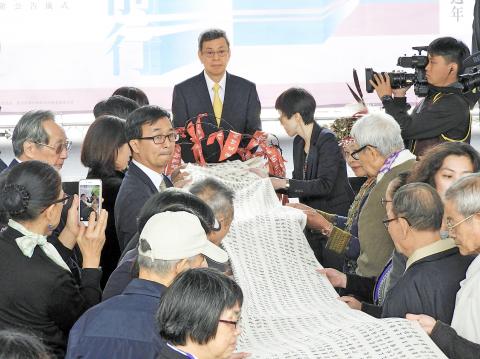The Transitional Justice Commission yesterday overturned the guilty convictions of 2,006 political victims of the White Terror and authoritarian eras, including former vice president Annette Lu (呂秀蓮) and Presidential Office Secretary-General Chen Chu (陳菊).
Former Examination Yuan president Yao Chia-wen (姚嘉文), former Democratic Progressive Party (DPP) chairman Huang Hsin-chieh (黃信介) and activist Shih Ming-te (施明德) were also part of a fourth group of people to be exonerated by the commission.
Lu, Chen Chu, Yao, Huang and Shih had been on the staff of Formosa Magazine (美麗島).

Photo: Chen Yu-fu, Taipei Times
The list also includes former Free China (自由中國) magazine staff members Lei Chen (雷震), Ma Chih-su (馬之驌), Fu Cheng (傅正) and Liu Tzu-ying (劉子英).
Chiang Kai-shek (蔣介石) had ordered that Lei should be imprisoned for no less than 10 years, the commission said.
While the two magazines were published at different periods of the post-World War II democracy movement, they adopted a similar approach: founding a magazine to discuss Taiwanese politics and promote democracy by bringing together a specific community, the commission said.
Using the magazines as a starting point, staff at the two publications worked toward forming a political group or party and putting democratic ideals into practice, it said.
They encountered political suppression, giving rise to some of the most notable cases of the authoritarian era, the commission said.
As early as the 1950s, Free China dared to criticize the government, it said.
In 1979, when Formosa Magazine was founded, a new wave of democracy advocates had emerged in Taiwan, but the government was still intolerant of social movements, it said.
Although their paths differed due to differences in their historical backgrounds, both magazines expressed the universality of the pursuit of human rights and democracy, it added.
The commission is to officially release the third and fourth lists of political victims to be exonerated at a ceremony at the Sheraton Grand Taipei Hotel on July 7.
The ceremony, to be called Intergenerational Witness (跨世代見證), carries multiple meanings and significance, the commission said.
By displaying the lists of political victims, it seeks to remove the stigma that victims and their families have been carrying for years, it said.
The commission also hopes that the revelation of the victims’ different narratives would let family members across generations witness together the traumatic events of the past and to, once again, emphasize to the public the urgency and necessity of the collective project of transitional justice, it said.
Many of the victims who were exonerated, such as Kuo Chen-chun (郭振純), Chen Hsin-chi (陳新吉) and Chen Chin-sheng (陳欽生), serve as volunteer guides at the National Human Rights Museum, which opened in New Taipei City in May last year, it said.
Kuo, Chen Hsin-chi and Chen Chin-sheng were convicted in the 1950s, 1960s and 1970s respectively, it said.
Kuo and Chen Hsin-chi dedicated themselves to passing on history to young students up until their deaths last year and earlier this month respectively, it said.
The commission said that 1,999 victims were exonerated under Article 6, Paragraph 3, Item 1 of the Act on Promoting Transitional Justice (促進轉型正義條例) and seven were exonerated under Article 6, Paragraph 1, Item 2 of the same act.

CHAOS: Iranians took to the streets playing celebratory music after reports of Khamenei’s death on Saturday, while mourners also gathered in Tehran yesterday Iranian Supreme Leader Ayatollah Ali Khamenei was killed in a major attack on Iran launched by Israel and the US, throwing the future of the Islamic republic into doubt and raising the risk of regional instability. Iranian state television and the state-run IRNA news agency announced the 86-year-old’s death early yesterday. US President Donald Trump said it gave Iranians their “greatest chance” to “take back” their country. The announcements came after a joint US and Israeli aerial bombardment that targeted Iranian military and governmental sites. Trump said the “heavy and pinpoint bombing” would continue through the week or as long

TRUST: The KMT said it respected the US’ timing and considerations, and hoped it would continue to honor its commitments to helping Taiwan bolster its defenses and deterrence US President Donald Trump is delaying a multibillion-dollar arms sale to Taiwan to ensure his visit to Beijing is successful, a New York Times report said. The weapons sales package has stalled in the US Department of State, the report said, citing US officials it did not identify. The White House has told agencies not to push forward ahead of Trump’s meeting with Chinese President Xi Jinping (習近平), it said. The two last month held a phone call to discuss trade and geopolitical flashpoints ahead of the summit. Xi raised the Taiwan issue and urged the US to handle arms sales to

State-run CPC Corp, Taiwan (CPC, 台灣中油) yesterday said that it had confirmed on Saturday night with its liquefied natural gas (LNG) and crude oil suppliers that shipments are proceeding as scheduled and that domestic supplies remain unaffected. The CPC yesterday announced the gasoline and diesel prices will rise by NT$0.2 and NT$0.4 per liter, respectively, starting Monday, citing Middle East tensions and blizzards in the eastern United States. CPC also iterated it has been reducing the proportion of crude oil imports from the Middle East and diversifying its supply sources in the past few years in response to geopolitical risks, expanding

Pro-democracy media tycoon Jimmy Lai’s (黎智英) fraud conviction and prison sentence were yesterday overturned by a Hong Kong court, in a surprise legal decision that comes soon after Lai was jailed for 20 years on a separate national security charge. Judges Jeremy Poon (潘兆初), Anthea Pang (彭寶琴) and Derek Pang (彭偉昌) said in the judgement that they allowed the appeal from Lai, and another defendant in the case, to proceed, as a lower court judge had “erred.” “The Court of Appeal gave them leave to appeal against their conviction, allowed their appeals, quashed the convictions and set aside the sentences,” the judges